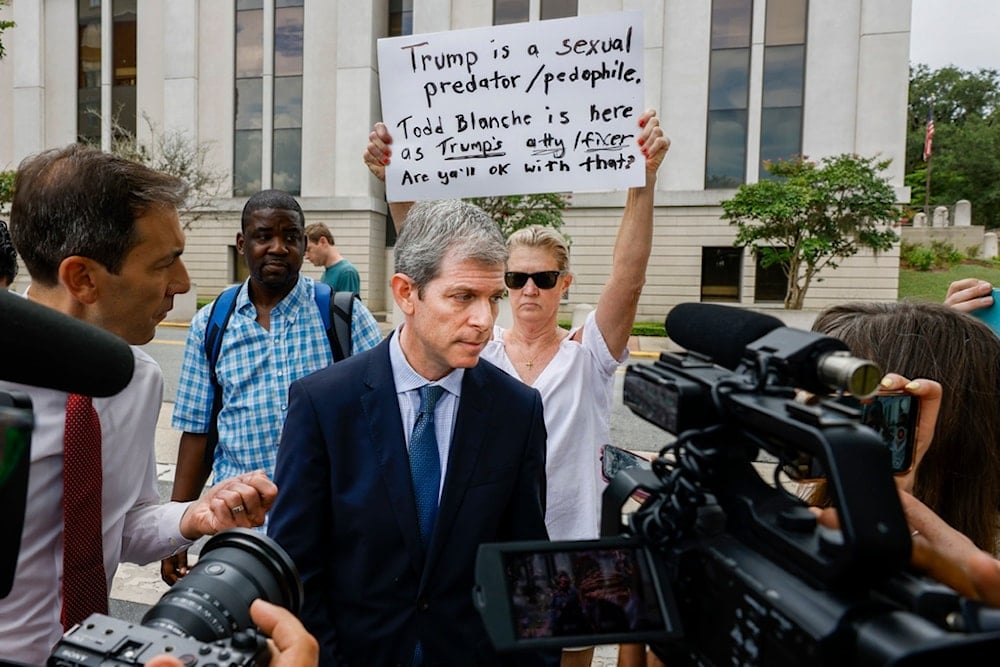Maxwell seeks immunity before testifying to Congress on Epstein
Ghislaine Maxwell has offered to testify before Congress, but only if granted full immunity, advance access to questions, and a delay until her Supreme Court appeal is resolved.
-

David Oscar Markus, an attorney for Ghislaine Maxwell, talks with the media outside the federal courthouse, Friday, July 25, 2025, in Tallahassee, Fla., after Deputy Attorney General Todd Blanche met with Maxwell, the imprisoned former girlfriend of financier and convicted sex offender Jeffrey Epstein. (AP Photo/Colin Hackley)
Ghislaine Maxwell, currently serving a 20-year sentence for her role in Jeffrey Epstein's sex-trafficking ring, has signaled her willingness to testify before the US Congress, but only under a strict set of legal safeguards, including full immunity from further prosecution.
Her attorney, David Oscar Markus, conveyed her position in a letter sent to House Oversight Committee Chairman James Comer, following Comer's announcement that Maxwell had been subpoenaed to provide a deposition on August 11 at the Federal Correctional Institution in Tallahassee, Florida. Congressman Scott Perry later confirmed that Maxwell was expected to appear before the committee in the coming weeks.
"After further reflection, we would like to find a way to cooperate with Congress if a fair and safe path forward can be established. Several conditions would need to be addressed for that to be possible," the letter to Comer reads.
The letter strongly objected to the committee's current plans, namely, holding the questioning inside a prison facility and proceeding without granting her legal immunity.
"Those are non-starters. Ms. Maxwell cannot risk further criminal exposure in a politically charged environment without formal immunity. Nor is a prison setting conducive to eliciting truthful and complete testimony. The potential for leaks from such a setting creates real security risks and undermines the integrity of the process," the letter says.
Maxwell is also requesting that she be given all questions in advance and that any testimony be postponed until after the US Supreme Court rules on her petition to overturn her conviction. A separate habeas corpus filing is also in preparation.
Maxwell seeks immunity
Earlier this week, Markus confirmed that Maxwell had submitted a formal appeal to the Supreme Court, asserting that a 2007 non-prosecution agreement between Epstein and the federal government should have protected her from being charged. "This case presents a straightforward and important question about the government's obligation to honor its promises in plea and non-prosecution agreements," Markus argued in the filing. He accused the Department of Justice of violating a binding deal made "on behalf of the United States" and trying to scapegoat Maxwell amid mounting political pressure.
Maxwell's Supreme Court appeal comes just after a reported closed-door meeting with top officials at the US Attorney's Office in Tallahassee, including Deputy Attorney General Todd Blanche. According to ABC News, that meeting coincided with renewed bipartisan demands for the public release of Epstein-related records.
The timing has also reignited speculation surrounding high-profile individuals allegedly linked to Epstein. Maxwell's brother Ian told The New York Post that she had prepared "new evidence" ahead of the DOJ meeting, while Epstein's brother Mark said in The Guardian that he would like to ask Maxwell directly "what the dirt was on Donald Trump," referencing Epstein's claims of possessing compromising material.
Meanwhile, US President Trump has acknowledged the possibility of a pardon for Maxwell but called it "inappropriate" to discuss further at this stage. Maxwell's legal team maintains she has not requested clemency, though she would not oppose it if offered.
Read more: Trump struggles to deflect pressure over Epstein ties: Reuters
Elite secrets
Maxwell was convicted in 2022 on charges including conspiracy to entice minors to engage in illegal sex acts and transporting a minor for criminal sexual activity. The crimes, according to prosecutors, occurred between 2002 and 2005, during which Epstein abused dozens of underage girls at his homes in New York and Florida, often paying them in cash and instructing some to recruit additional victims, including girls as young as 14.
Epstein was arrested in 2019 on federal trafficking charges. He died in jail weeks later in what authorities ruled a suicide, though public suspicion has persisted, especially in light of repeated FBI denials that any "client list" or blackmail operation ever existed. Speculation has only intensified following Elon Musk's recent claims that Epstein files remain sealed because they implicate powerful figures such as Trump.
As Maxwell's legal maneuvering continues and Congress presses forward, the case remains emblematic of broader concerns over elite impunity, institutional accountability, and the unresolved questions surrounding Epstein's criminal network.

 4 Min Read
4 Min Read










